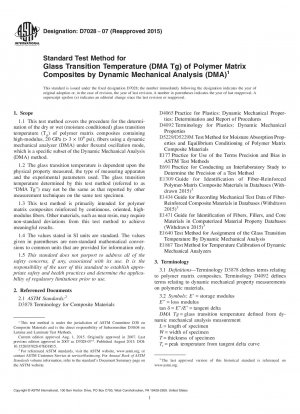ASTM D7028-07(2015)
Standard Test Method for Glass Transition Temperature (DMA Tg) of Polymer Matrix Composites by Dynamic Mechanical Analysis (DMA)
- Standard No.
- ASTM D7028-07(2015)
- Release Date
- 2007
- Published By
- American Society for Testing and Materials (ASTM)
- Status
- Replace By
- ASTM D7028-07(2024)
- Latest
- ASTM D7028-07(2024)
- Scope
5.1 This test method is designed to determine the glass transition temperature of continuous fiber reinforced polymer composites using the DMA method. The DMA Tg value is frequently used to indicate the upper use temperature of composite materials, as well as for quality control of composite materials.
1.1 This test method covers the procedure for the determination of the dry or wet (moisture conditioned) glass transition temperature (Tg) of polymer matrix composites containing high-modulus, 20 GPa (> 3 × 106 psi), fibers using a dynamic mechanical analyzer (DMA) under flexural oscillation mode, which is a specific subset of the Dynamic Mechanical Analysis (DMA) method.
1.2 The glass transition temperature is dependent upon the physical property measured, the type of measuring apparatus and the experimental parameters used. The glass transition temperature determined by this test method (referred to as “DMA Tg”) may not be the same as that reported by other measurement techniques on the same test specimen.
1.3 This test method is primarily intended for polymer matrix composites reinforced by continuous, oriented, high-modulus fibers. Other materials, such as neat resin, may require non-standard deviations from this test method to achieve meaningful results.
1.4 The values stated in SI units are standard. The values given in parentheses are non-standard mathematical conversions to common units that are provided for information only.
1.5 This standard does not purport to address all of the safety concerns, if any, associated with its use. It is the responsibility of the user of this standard to establish appropriate safety and health practices and determine the applicability of regulatory limitations prior to use.
ASTM D7028-07(2015) Referenced Document
- ASTM D3878 Standard Terminology Composite Materials
- ASTM D4065 Standard Practice for Plastics: Dynamic Mechanical Properties: Determination and Report of Procedures
- ASTM D4092 Standard Terminology: Plastics: Dynamic Mechanical Properties
- ASTM D5229/D5229M Standard Test Method for Moisture Absorption Properties and Equilibrium Conditioning of Polymer Matrix Composite Materials
- ASTM E1309 Standard Guide for Identification of Fiber-Reinforced Polymer-Matrix Composite Materials in Databases
- ASTM E1434 Standard Guide for Recording Mechanical Test Data of Fiber-Reinforced Composite Materials in Databases
- ASTM E1471 Standard Guide for Identification of Fibers, Fillers, and Core Materials in Computerized Material Property Databases
- ASTM E1640 Standard Test Method for Assignment of the Glass Transition Temperature By Dynamic Mechanical Analysis
- ASTM E177 Standard Practice for Use of the Terms Precision and Bias in ASTM Test Methods
- ASTM E1867 Standard Test Method for Temperature Calibration of Dynamic Mechanical Analyzers
- ASTM E691 Standard Practice for Conducting an Interlaboratory Study to Determine the Precision of a Test Method
ASTM D7028-07(2015) history
- 2024 ASTM D7028-07(2024) Standard Test Method for Glass Transition Temperature (DMA Tg) of Polymer Matrix Composites by Dynamic Mechanical Analysis (DMA)
- 2007 ASTM D7028-07(2015) Standard Test Method for Glass Transition Temperature (DMA Tg) of Polymer Matrix Composites by Dynamic Mechanical Analysis (DMA)
- 2007 ASTM D7028-07e1 Standard Test Method for Glass Transition Temperature (DMA Tg) of Polymer Matrix Composites by Dynamic Mechanical Analysis (DMA)
- 2007 ASTM D7028-07 Standard Test Method for Glass Transition Temperature (DMA Tg) of Polymer Matrix Composites by Dynamic Mechanical Analysis (DMA)
